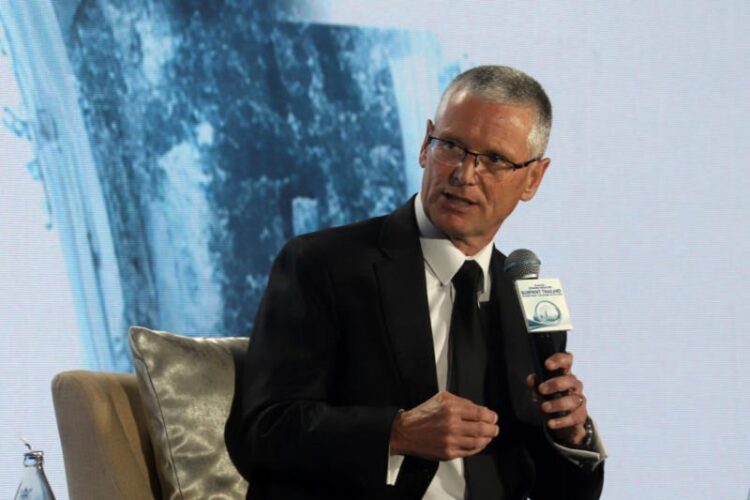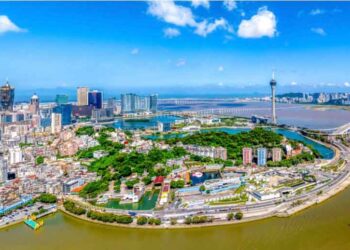Thailand must establish a formal tourism board that understands the importance of treating the industry like a business if it is to compete with rising regional competition and reestablish itself as a genuine Asian tourism powerhouse, says Galaxy Entertainment Group’s Chief Brand Officer Thailand, Kevin Clayton.
It must also accept the value of manmade structures rather than simply relying on its natural attractions such as culture, food and hospitality, Clayton explained while speaking at the “Bangkok Post Economic Forum 2025” on Friday.
Thailand’s declining tourism numbers have been a growing concern in 2025, with the nearly 40 million visitor arrivals the nation peaked at in 2019 having fallen back to an estimated 33 million by the end of this year – a drop of around 17.5% due largely to fewer arrivals from China. Tourism industry revenues are also estimated to have fallen from around US$60 billion to around US$48 billion.
Clayton noted that any business experiencing such a decline in revenues would make structural changes to the organization and urged Thailand to approach its tourism issues in the same vein.
“[Tourism] needs to be treated as a commercial business, so firstly I would establish a tourism board,” he said, explaining that the existing Tourism Authority of Thailand (TAT) is not the right body to be formulating broader tourism strategies.
“There needs to be a real evaluation of what products need to be developed, what services need to be developed, what role does AI and technology play in tourism into the future and what type of infrastructure you need to put into the big cities because they are difficult to get around.
“You need to ask what you want to make that is truly signature for the country and what do you want to make that is truly iconic for the country? And then you need to get billions of dollars worth of investment from third parties, from the private sector investing in Thailand.
“That will only come from a really powerful tourism board comprising the CEOs of airlines and CEOs of associations, with input from TAT and input from the government.
“It should be independent of the government but at the same time backed by the government.”
Clayton, who represents Galaxy’s pursuit of any future expansion opportunity in Thailand via the legalization of casinos within large-scale entertainment complexes, added that Thailand must understand that tourism today can no longer rely solely on cultural experiences but needs to combine natural appeal with destination manmade structures.
Singapore, he observed, has “never looked back” since opening its integrated resorts Marina Bay Sands and Resorts World Sentosa in 2010, while Japan is developing its first IR in Osaka and Vietnam is building entire cities focused on attracting tourists.
“Thailand is obviously unique in its own right in terms of culture and food and some of the striking beaches it has, but we all know tourism has expanded beyond that – and manmade attractions now are the call of the day internationally, whether that’s theme parks, whether it’s integrated resorts, whether it’s a function of much larger destinations,” he said.
“There is a place for manmade attractions for Thailand and it needs to come to accept that.
“It should be complementary to what makes Thailand unique because you don’t want to lose the cultural aspect of Thailand, but what you do want is to expand upon its wealth of attractions, in particular for Bangkok.
“It needs additional destinations that are attractive to a bigger international audience and in particular higher yielding customers who are willing to spend a significant amount of money now to go into a location, experience the culture, experience the food. But they want a different form of entertainment.
“That entertainment can be a function of live entertainment or it can be, dare I say, a gambling destination, which is loved by many, many people.
“But there has to be an acceptance of that and it’s got to be done with some sensitivity.”
Thailand, Clayton said, has an opportunity to reach 45 million visitors by 2030 and close to 60 million by 2035 because of its ideal location. Tourism, he explained, is one of the largest growth industries worldwide and particularly in Asia-Pacific – driven by the rising middle and upper middle classes in China, India and the Middle East.
“But if Thailand wants to be a leader and wants to maintain its leadership in tourism then it has to have a rethink,” Clayton said.
“So, as much as Thailand is known for its culture and its welcome and its food, tourism is much more than that right now and therefore there has to be an advancement of thinking for Thailand in terms of where it wants to be now and into the future when it comes to tourism.”



































